Evaluating Supply Chain, Procurement, and Ethics in Food Service
VerifiedAdded on 2023/06/13
|14
|3924
|337
Report
AI Summary
This report provides a comprehensive analysis of food service management within the context of Restaurant Group Plc, focusing on supply chain approaches, procurement processes, and the significance of ethical practices. It examines various food supply chain models, including short supply chains, alternative food networks, direct supply chains, and extended food supply chains, highlighting key stakeholders and their roles. The report also discusses the principles of effective procurement, such as value for money, fairness, integrity, transparency, internal competition, and client centricity, and evaluates sourcing processes like specification, market assessment, negotiation, and contracting. Furthermore, it assesses the application of analytical tools like SWOT and PESTLE analysis for supporting effective management strategies and evaluates the impact of ethical practices and corporate social responsibility on overall business success. The report concludes with recommendations for enhancing management practices and strategies to improve business operations.
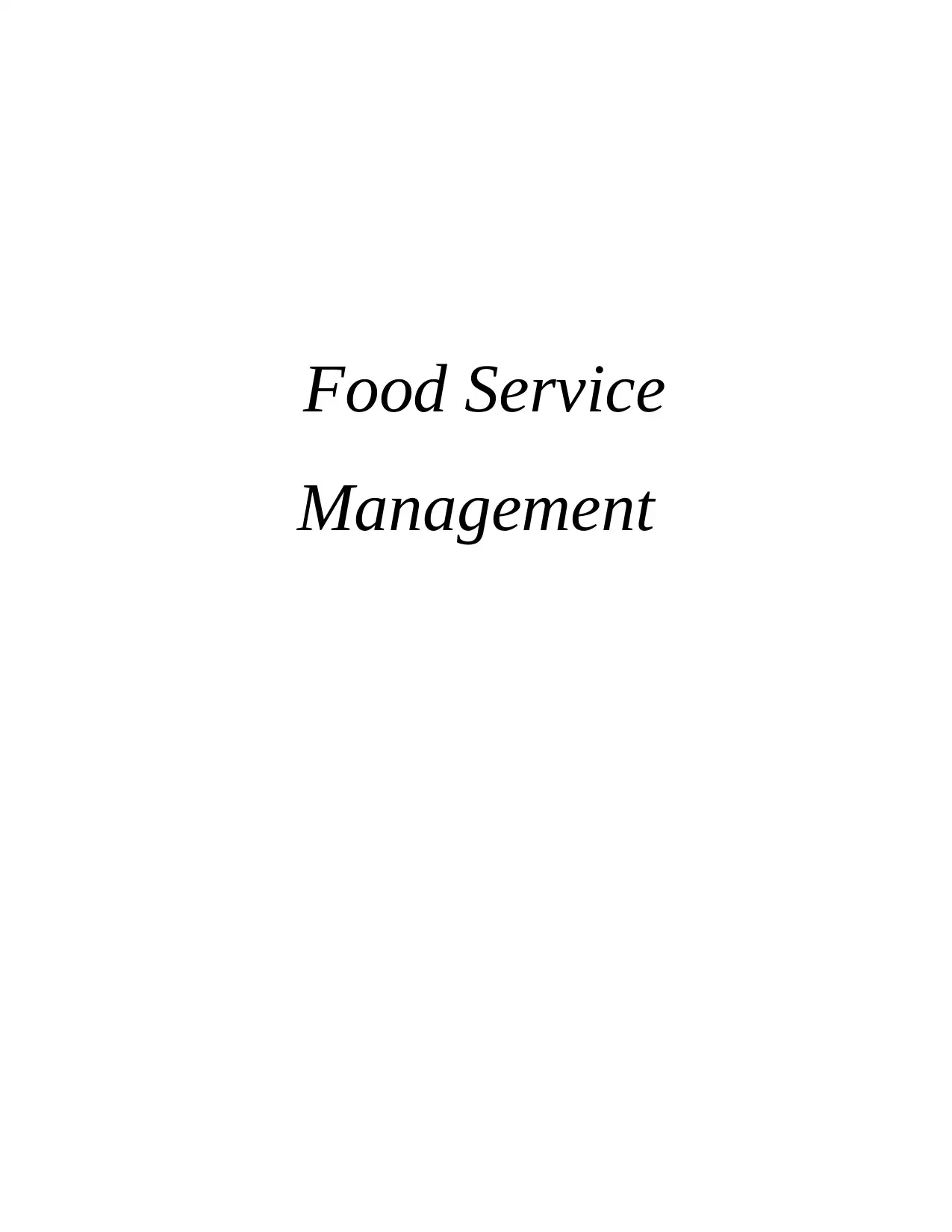
Food Service
Management
Management
Paraphrase This Document
Need a fresh take? Get an instant paraphrase of this document with our AI Paraphraser
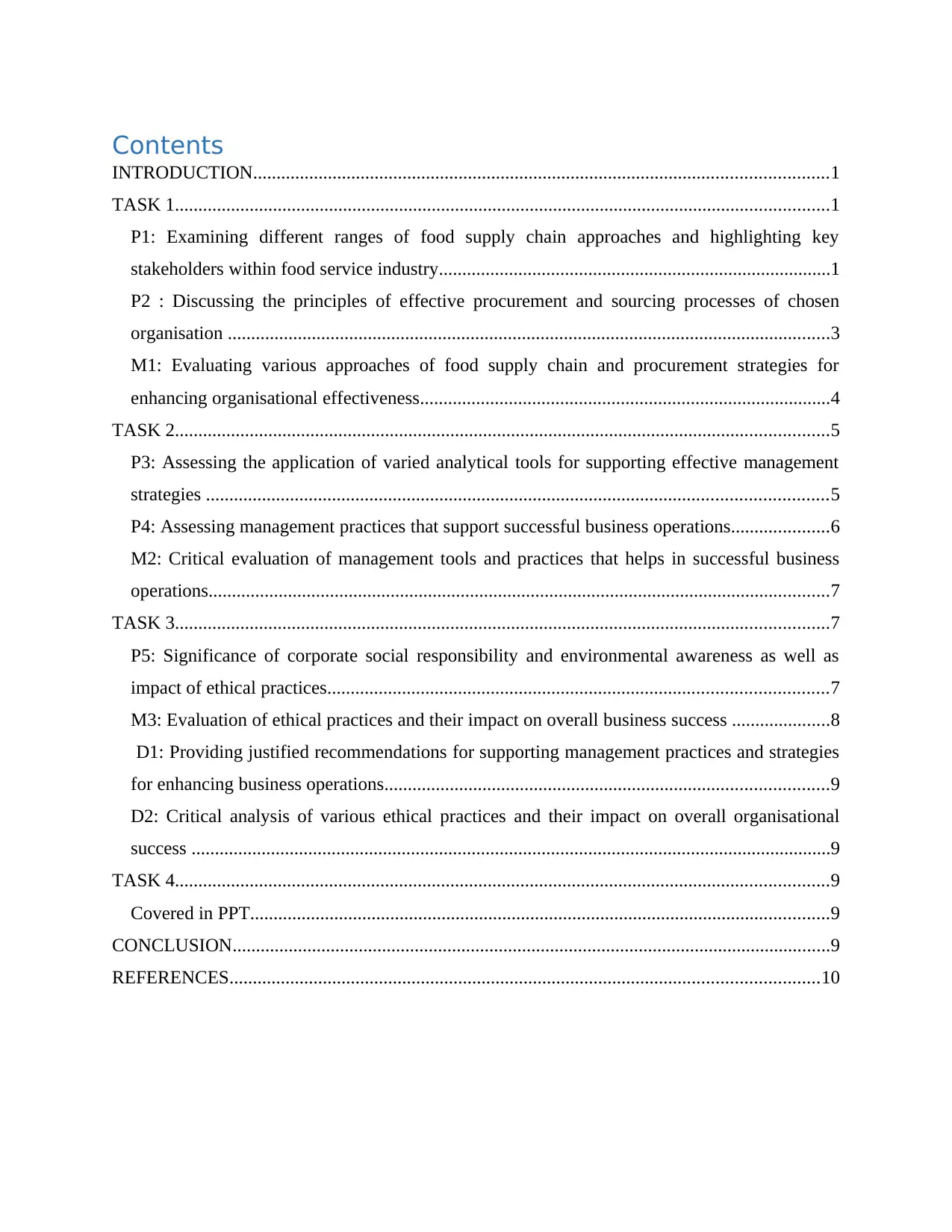
Contents
INTRODUCTION...........................................................................................................................1
TASK 1............................................................................................................................................1
P1: Examining different ranges of food supply chain approaches and highlighting key
stakeholders within food service industry....................................................................................1
P2 : Discussing the principles of effective procurement and sourcing processes of chosen
organisation .................................................................................................................................3
M1: Evaluating various approaches of food supply chain and procurement strategies for
enhancing organisational effectiveness........................................................................................4
TASK 2............................................................................................................................................5
P3: Assessing the application of varied analytical tools for supporting effective management
strategies .....................................................................................................................................5
P4: Assessing management practices that support successful business operations.....................6
M2: Critical evaluation of management tools and practices that helps in successful business
operations.....................................................................................................................................7
TASK 3............................................................................................................................................7
P5: Significance of corporate social responsibility and environmental awareness as well as
impact of ethical practices...........................................................................................................7
M3: Evaluation of ethical practices and their impact on overall business success .....................8
D1: Providing justified recommendations for supporting management practices and strategies
for enhancing business operations...............................................................................................9
D2: Critical analysis of various ethical practices and their impact on overall organisational
success .........................................................................................................................................9
TASK 4............................................................................................................................................9
Covered in PPT............................................................................................................................9
CONCLUSION................................................................................................................................9
REFERENCES..............................................................................................................................10
INTRODUCTION...........................................................................................................................1
TASK 1............................................................................................................................................1
P1: Examining different ranges of food supply chain approaches and highlighting key
stakeholders within food service industry....................................................................................1
P2 : Discussing the principles of effective procurement and sourcing processes of chosen
organisation .................................................................................................................................3
M1: Evaluating various approaches of food supply chain and procurement strategies for
enhancing organisational effectiveness........................................................................................4
TASK 2............................................................................................................................................5
P3: Assessing the application of varied analytical tools for supporting effective management
strategies .....................................................................................................................................5
P4: Assessing management practices that support successful business operations.....................6
M2: Critical evaluation of management tools and practices that helps in successful business
operations.....................................................................................................................................7
TASK 3............................................................................................................................................7
P5: Significance of corporate social responsibility and environmental awareness as well as
impact of ethical practices...........................................................................................................7
M3: Evaluation of ethical practices and their impact on overall business success .....................8
D1: Providing justified recommendations for supporting management practices and strategies
for enhancing business operations...............................................................................................9
D2: Critical analysis of various ethical practices and their impact on overall organisational
success .........................................................................................................................................9
TASK 4............................................................................................................................................9
Covered in PPT............................................................................................................................9
CONCLUSION................................................................................................................................9
REFERENCES..............................................................................................................................10

⊘ This is a preview!⊘
Do you want full access?
Subscribe today to unlock all pages.

Trusted by 1+ million students worldwide
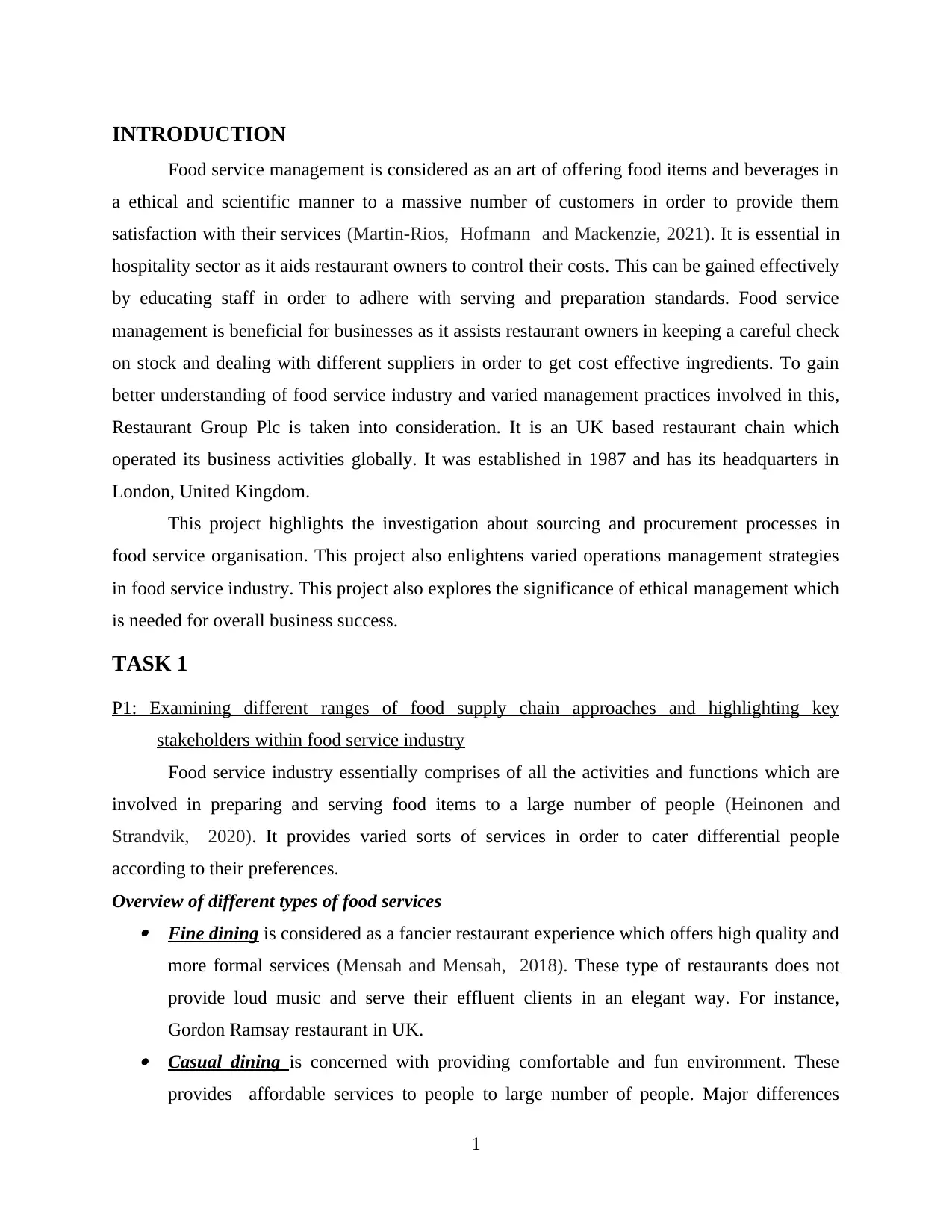
INTRODUCTION
Food service management is considered as an art of offering food items and beverages in
a ethical and scientific manner to a massive number of customers in order to provide them
satisfaction with their services (Martin-Rios, Hofmann and Mackenzie, 2021). It is essential in
hospitality sector as it aids restaurant owners to control their costs. This can be gained effectively
by educating staff in order to adhere with serving and preparation standards. Food service
management is beneficial for businesses as it assists restaurant owners in keeping a careful check
on stock and dealing with different suppliers in order to get cost effective ingredients. To gain
better understanding of food service industry and varied management practices involved in this,
Restaurant Group Plc is taken into consideration. It is an UK based restaurant chain which
operated its business activities globally. It was established in 1987 and has its headquarters in
London, United Kingdom.
This project highlights the investigation about sourcing and procurement processes in
food service organisation. This project also enlightens varied operations management strategies
in food service industry. This project also explores the significance of ethical management which
is needed for overall business success.
TASK 1
P1: Examining different ranges of food supply chain approaches and highlighting key
stakeholders within food service industry
Food service industry essentially comprises of all the activities and functions which are
involved in preparing and serving food items to a large number of people (Heinonen and
Strandvik, 2020). It provides varied sorts of services in order to cater differential people
according to their preferences.
Overview of different types of food services Fine dining is considered as a fancier restaurant experience which offers high quality and
more formal services (Mensah and Mensah, 2018). These type of restaurants does not
provide loud music and serve their effluent clients in an elegant way. For instance,
Gordon Ramsay restaurant in UK. Casual dining is concerned with providing comfortable and fun environment. These
provides affordable services to people to large number of people. Major differences
1
Food service management is considered as an art of offering food items and beverages in
a ethical and scientific manner to a massive number of customers in order to provide them
satisfaction with their services (Martin-Rios, Hofmann and Mackenzie, 2021). It is essential in
hospitality sector as it aids restaurant owners to control their costs. This can be gained effectively
by educating staff in order to adhere with serving and preparation standards. Food service
management is beneficial for businesses as it assists restaurant owners in keeping a careful check
on stock and dealing with different suppliers in order to get cost effective ingredients. To gain
better understanding of food service industry and varied management practices involved in this,
Restaurant Group Plc is taken into consideration. It is an UK based restaurant chain which
operated its business activities globally. It was established in 1987 and has its headquarters in
London, United Kingdom.
This project highlights the investigation about sourcing and procurement processes in
food service organisation. This project also enlightens varied operations management strategies
in food service industry. This project also explores the significance of ethical management which
is needed for overall business success.
TASK 1
P1: Examining different ranges of food supply chain approaches and highlighting key
stakeholders within food service industry
Food service industry essentially comprises of all the activities and functions which are
involved in preparing and serving food items to a large number of people (Heinonen and
Strandvik, 2020). It provides varied sorts of services in order to cater differential people
according to their preferences.
Overview of different types of food services Fine dining is considered as a fancier restaurant experience which offers high quality and
more formal services (Mensah and Mensah, 2018). These type of restaurants does not
provide loud music and serve their effluent clients in an elegant way. For instance,
Gordon Ramsay restaurant in UK. Casual dining is concerned with providing comfortable and fun environment. These
provides affordable services to people to large number of people. Major differences
1
Paraphrase This Document
Need a fresh take? Get an instant paraphrase of this document with our AI Paraphraser
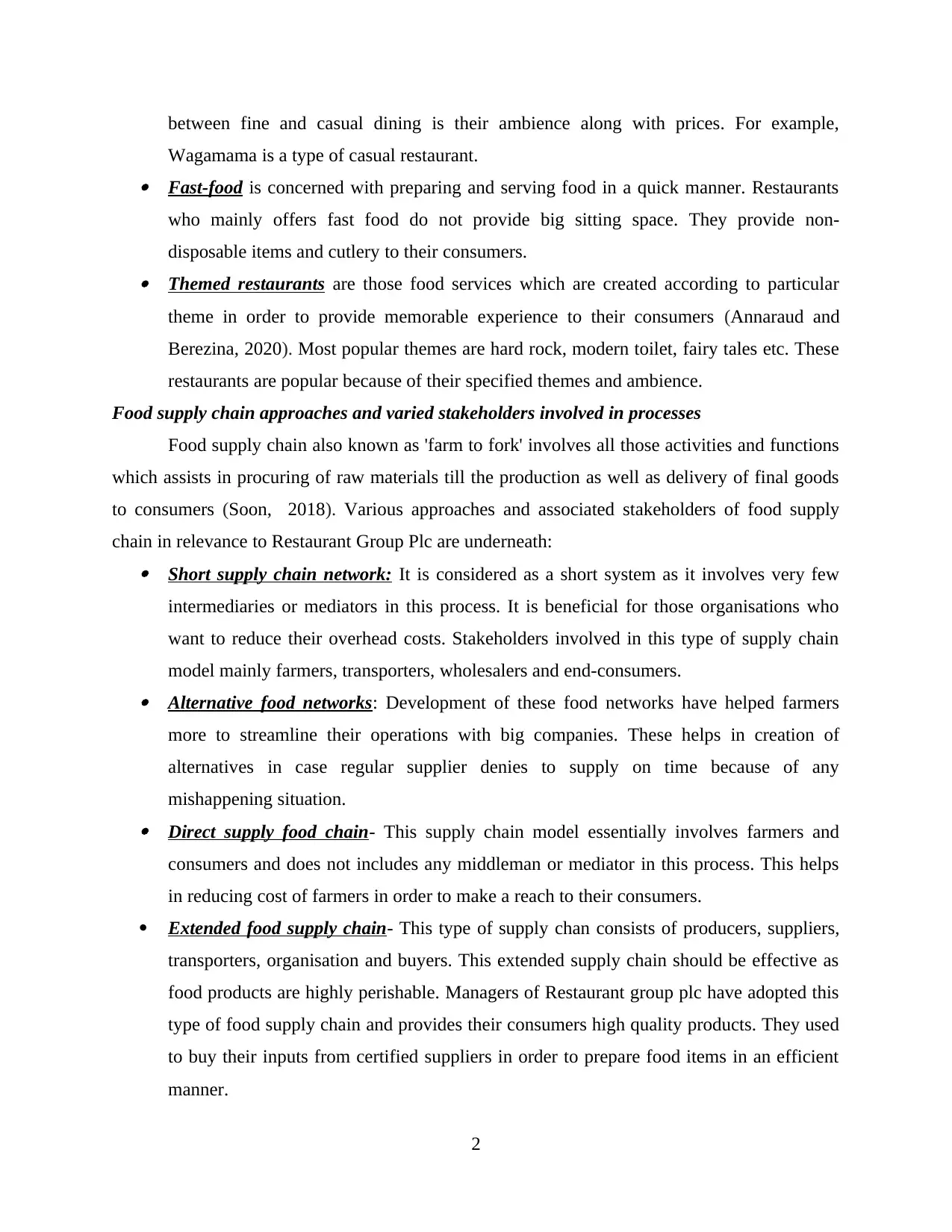
between fine and casual dining is their ambience along with prices. For example,
Wagamama is a type of casual restaurant. Fast-food is concerned with preparing and serving food in a quick manner. Restaurants
who mainly offers fast food do not provide big sitting space. They provide non-
disposable items and cutlery to their consumers. Themed restaurants are those food services which are created according to particular
theme in order to provide memorable experience to their consumers (Annaraud and
Berezina, 2020). Most popular themes are hard rock, modern toilet, fairy tales etc. These
restaurants are popular because of their specified themes and ambience.
Food supply chain approaches and varied stakeholders involved in processes
Food supply chain also known as 'farm to fork' involves all those activities and functions
which assists in procuring of raw materials till the production as well as delivery of final goods
to consumers (Soon, 2018). Various approaches and associated stakeholders of food supply
chain in relevance to Restaurant Group Plc are underneath: Short supply chain network: It is considered as a short system as it involves very few
intermediaries or mediators in this process. It is beneficial for those organisations who
want to reduce their overhead costs. Stakeholders involved in this type of supply chain
model mainly farmers, transporters, wholesalers and end-consumers. Alternative food networks: Development of these food networks have helped farmers
more to streamline their operations with big companies. These helps in creation of
alternatives in case regular supplier denies to supply on time because of any
mishappening situation. Direct supply food chain- This supply chain model essentially involves farmers and
consumers and does not includes any middleman or mediator in this process. This helps
in reducing cost of farmers in order to make a reach to their consumers.
Extended food supply chain- This type of supply chan consists of producers, suppliers,
transporters, organisation and buyers. This extended supply chain should be effective as
food products are highly perishable. Managers of Restaurant group plc have adopted this
type of food supply chain and provides their consumers high quality products. They used
to buy their inputs from certified suppliers in order to prepare food items in an efficient
manner.
2
Wagamama is a type of casual restaurant. Fast-food is concerned with preparing and serving food in a quick manner. Restaurants
who mainly offers fast food do not provide big sitting space. They provide non-
disposable items and cutlery to their consumers. Themed restaurants are those food services which are created according to particular
theme in order to provide memorable experience to their consumers (Annaraud and
Berezina, 2020). Most popular themes are hard rock, modern toilet, fairy tales etc. These
restaurants are popular because of their specified themes and ambience.
Food supply chain approaches and varied stakeholders involved in processes
Food supply chain also known as 'farm to fork' involves all those activities and functions
which assists in procuring of raw materials till the production as well as delivery of final goods
to consumers (Soon, 2018). Various approaches and associated stakeholders of food supply
chain in relevance to Restaurant Group Plc are underneath: Short supply chain network: It is considered as a short system as it involves very few
intermediaries or mediators in this process. It is beneficial for those organisations who
want to reduce their overhead costs. Stakeholders involved in this type of supply chain
model mainly farmers, transporters, wholesalers and end-consumers. Alternative food networks: Development of these food networks have helped farmers
more to streamline their operations with big companies. These helps in creation of
alternatives in case regular supplier denies to supply on time because of any
mishappening situation. Direct supply food chain- This supply chain model essentially involves farmers and
consumers and does not includes any middleman or mediator in this process. This helps
in reducing cost of farmers in order to make a reach to their consumers.
Extended food supply chain- This type of supply chan consists of producers, suppliers,
transporters, organisation and buyers. This extended supply chain should be effective as
food products are highly perishable. Managers of Restaurant group plc have adopted this
type of food supply chain and provides their consumers high quality products. They used
to buy their inputs from certified suppliers in order to prepare food items in an efficient
manner.
2
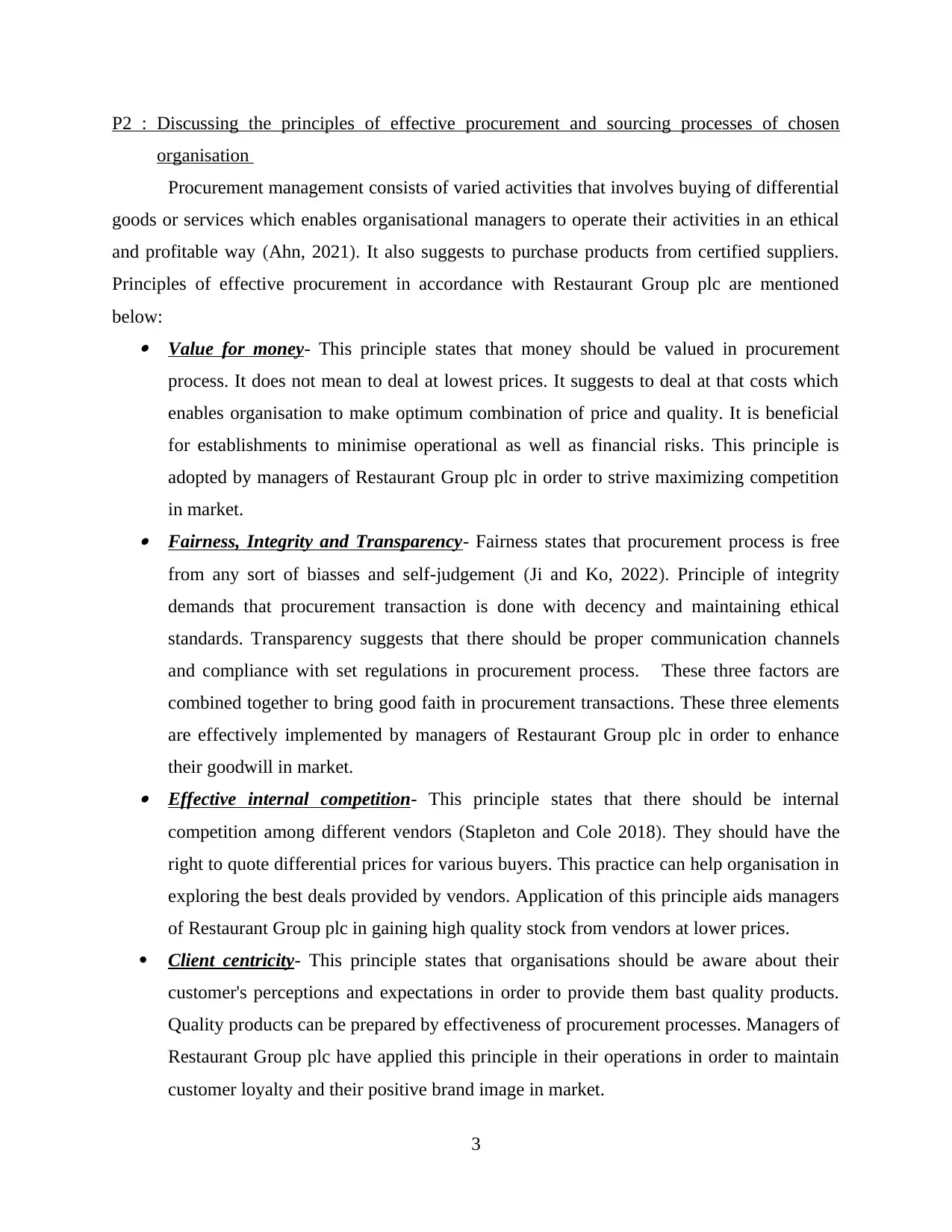
P2 : Discussing the principles of effective procurement and sourcing processes of chosen
organisation
Procurement management consists of varied activities that involves buying of differential
goods or services which enables organisational managers to operate their activities in an ethical
and profitable way (Ahn, 2021). It also suggests to purchase products from certified suppliers.
Principles of effective procurement in accordance with Restaurant Group plc are mentioned
below: Value for money- This principle states that money should be valued in procurement
process. It does not mean to deal at lowest prices. It suggests to deal at that costs which
enables organisation to make optimum combination of price and quality. It is beneficial
for establishments to minimise operational as well as financial risks. This principle is
adopted by managers of Restaurant Group plc in order to strive maximizing competition
in market. Fairness, Integrity and Transparency- Fairness states that procurement process is free
from any sort of biasses and self-judgement (Ji and Ko, 2022). Principle of integrity
demands that procurement transaction is done with decency and maintaining ethical
standards. Transparency suggests that there should be proper communication channels
and compliance with set regulations in procurement process. These three factors are
combined together to bring good faith in procurement transactions. These three elements
are effectively implemented by managers of Restaurant Group plc in order to enhance
their goodwill in market. Effective internal competition- This principle states that there should be internal
competition among different vendors (Stapleton and Cole 2018). They should have the
right to quote differential prices for various buyers. This practice can help organisation in
exploring the best deals provided by vendors. Application of this principle aids managers
of Restaurant Group plc in gaining high quality stock from vendors at lower prices.
Client centricity- This principle states that organisations should be aware about their
customer's perceptions and expectations in order to provide them bast quality products.
Quality products can be prepared by effectiveness of procurement processes. Managers of
Restaurant Group plc have applied this principle in their operations in order to maintain
customer loyalty and their positive brand image in market.
3
organisation
Procurement management consists of varied activities that involves buying of differential
goods or services which enables organisational managers to operate their activities in an ethical
and profitable way (Ahn, 2021). It also suggests to purchase products from certified suppliers.
Principles of effective procurement in accordance with Restaurant Group plc are mentioned
below: Value for money- This principle states that money should be valued in procurement
process. It does not mean to deal at lowest prices. It suggests to deal at that costs which
enables organisation to make optimum combination of price and quality. It is beneficial
for establishments to minimise operational as well as financial risks. This principle is
adopted by managers of Restaurant Group plc in order to strive maximizing competition
in market. Fairness, Integrity and Transparency- Fairness states that procurement process is free
from any sort of biasses and self-judgement (Ji and Ko, 2022). Principle of integrity
demands that procurement transaction is done with decency and maintaining ethical
standards. Transparency suggests that there should be proper communication channels
and compliance with set regulations in procurement process. These three factors are
combined together to bring good faith in procurement transactions. These three elements
are effectively implemented by managers of Restaurant Group plc in order to enhance
their goodwill in market. Effective internal competition- This principle states that there should be internal
competition among different vendors (Stapleton and Cole 2018). They should have the
right to quote differential prices for various buyers. This practice can help organisation in
exploring the best deals provided by vendors. Application of this principle aids managers
of Restaurant Group plc in gaining high quality stock from vendors at lower prices.
Client centricity- This principle states that organisations should be aware about their
customer's perceptions and expectations in order to provide them bast quality products.
Quality products can be prepared by effectiveness of procurement processes. Managers of
Restaurant Group plc have applied this principle in their operations in order to maintain
customer loyalty and their positive brand image in market.
3
⊘ This is a preview!⊘
Do you want full access?
Subscribe today to unlock all pages.

Trusted by 1+ million students worldwide
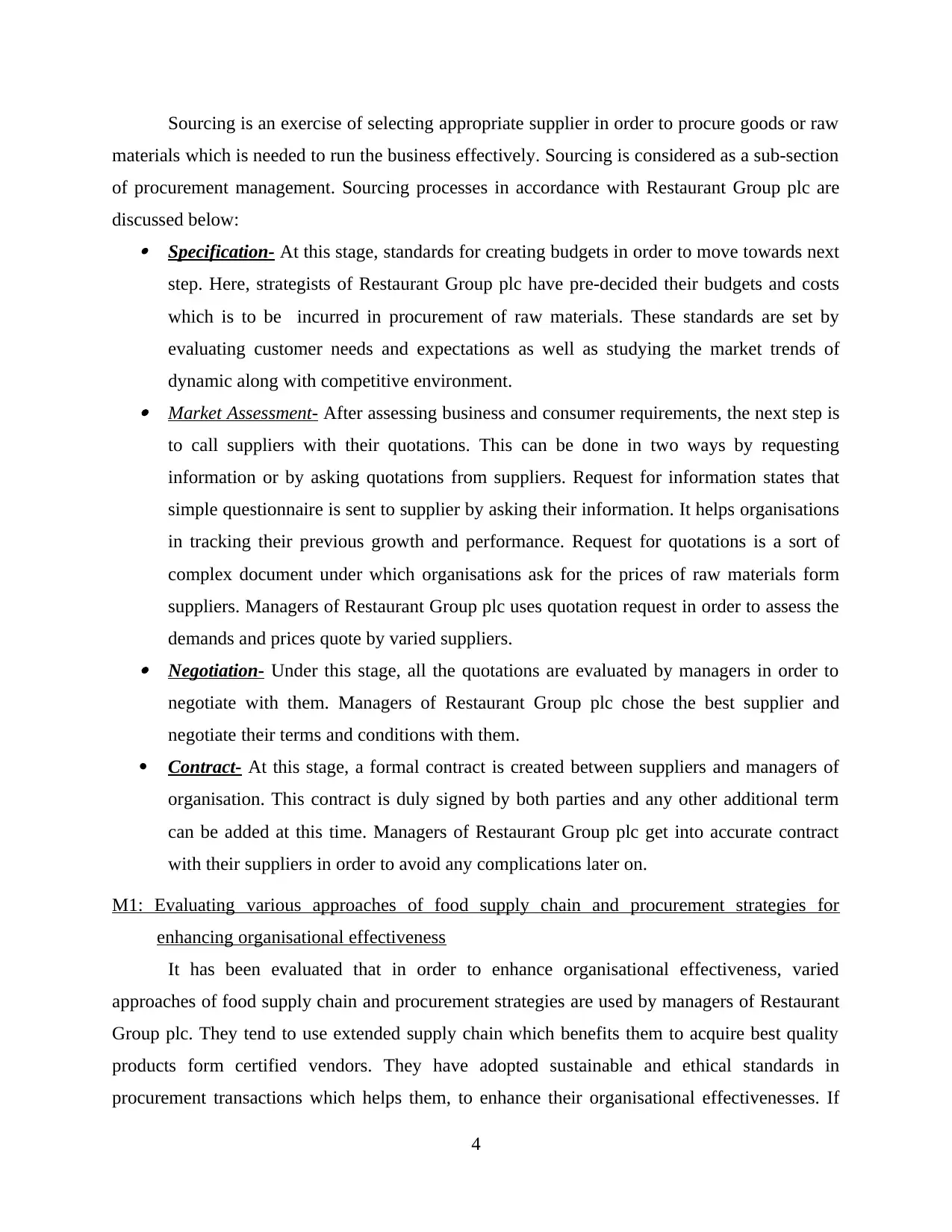
Sourcing is an exercise of selecting appropriate supplier in order to procure goods or raw
materials which is needed to run the business effectively. Sourcing is considered as a sub-section
of procurement management. Sourcing processes in accordance with Restaurant Group plc are
discussed below: Specification- At this stage, standards for creating budgets in order to move towards next
step. Here, strategists of Restaurant Group plc have pre-decided their budgets and costs
which is to be incurred in procurement of raw materials. These standards are set by
evaluating customer needs and expectations as well as studying the market trends of
dynamic along with competitive environment. Market Assessment- After assessing business and consumer requirements, the next step is
to call suppliers with their quotations. This can be done in two ways by requesting
information or by asking quotations from suppliers. Request for information states that
simple questionnaire is sent to supplier by asking their information. It helps organisations
in tracking their previous growth and performance. Request for quotations is a sort of
complex document under which organisations ask for the prices of raw materials form
suppliers. Managers of Restaurant Group plc uses quotation request in order to assess the
demands and prices quote by varied suppliers. Negotiation- Under this stage, all the quotations are evaluated by managers in order to
negotiate with them. Managers of Restaurant Group plc chose the best supplier and
negotiate their terms and conditions with them.
Contract- At this stage, a formal contract is created between suppliers and managers of
organisation. This contract is duly signed by both parties and any other additional term
can be added at this time. Managers of Restaurant Group plc get into accurate contract
with their suppliers in order to avoid any complications later on.
M1: Evaluating various approaches of food supply chain and procurement strategies for
enhancing organisational effectiveness
It has been evaluated that in order to enhance organisational effectiveness, varied
approaches of food supply chain and procurement strategies are used by managers of Restaurant
Group plc. They tend to use extended supply chain which benefits them to acquire best quality
products form certified vendors. They have adopted sustainable and ethical standards in
procurement transactions which helps them, to enhance their organisational effectivenesses. If
4
materials which is needed to run the business effectively. Sourcing is considered as a sub-section
of procurement management. Sourcing processes in accordance with Restaurant Group plc are
discussed below: Specification- At this stage, standards for creating budgets in order to move towards next
step. Here, strategists of Restaurant Group plc have pre-decided their budgets and costs
which is to be incurred in procurement of raw materials. These standards are set by
evaluating customer needs and expectations as well as studying the market trends of
dynamic along with competitive environment. Market Assessment- After assessing business and consumer requirements, the next step is
to call suppliers with their quotations. This can be done in two ways by requesting
information or by asking quotations from suppliers. Request for information states that
simple questionnaire is sent to supplier by asking their information. It helps organisations
in tracking their previous growth and performance. Request for quotations is a sort of
complex document under which organisations ask for the prices of raw materials form
suppliers. Managers of Restaurant Group plc uses quotation request in order to assess the
demands and prices quote by varied suppliers. Negotiation- Under this stage, all the quotations are evaluated by managers in order to
negotiate with them. Managers of Restaurant Group plc chose the best supplier and
negotiate their terms and conditions with them.
Contract- At this stage, a formal contract is created between suppliers and managers of
organisation. This contract is duly signed by both parties and any other additional term
can be added at this time. Managers of Restaurant Group plc get into accurate contract
with their suppliers in order to avoid any complications later on.
M1: Evaluating various approaches of food supply chain and procurement strategies for
enhancing organisational effectiveness
It has been evaluated that in order to enhance organisational effectiveness, varied
approaches of food supply chain and procurement strategies are used by managers of Restaurant
Group plc. They tend to use extended supply chain which benefits them to acquire best quality
products form certified vendors. They have adopted sustainable and ethical standards in
procurement transactions which helps them, to enhance their organisational effectivenesses. If
4
Paraphrase This Document
Need a fresh take? Get an instant paraphrase of this document with our AI Paraphraser
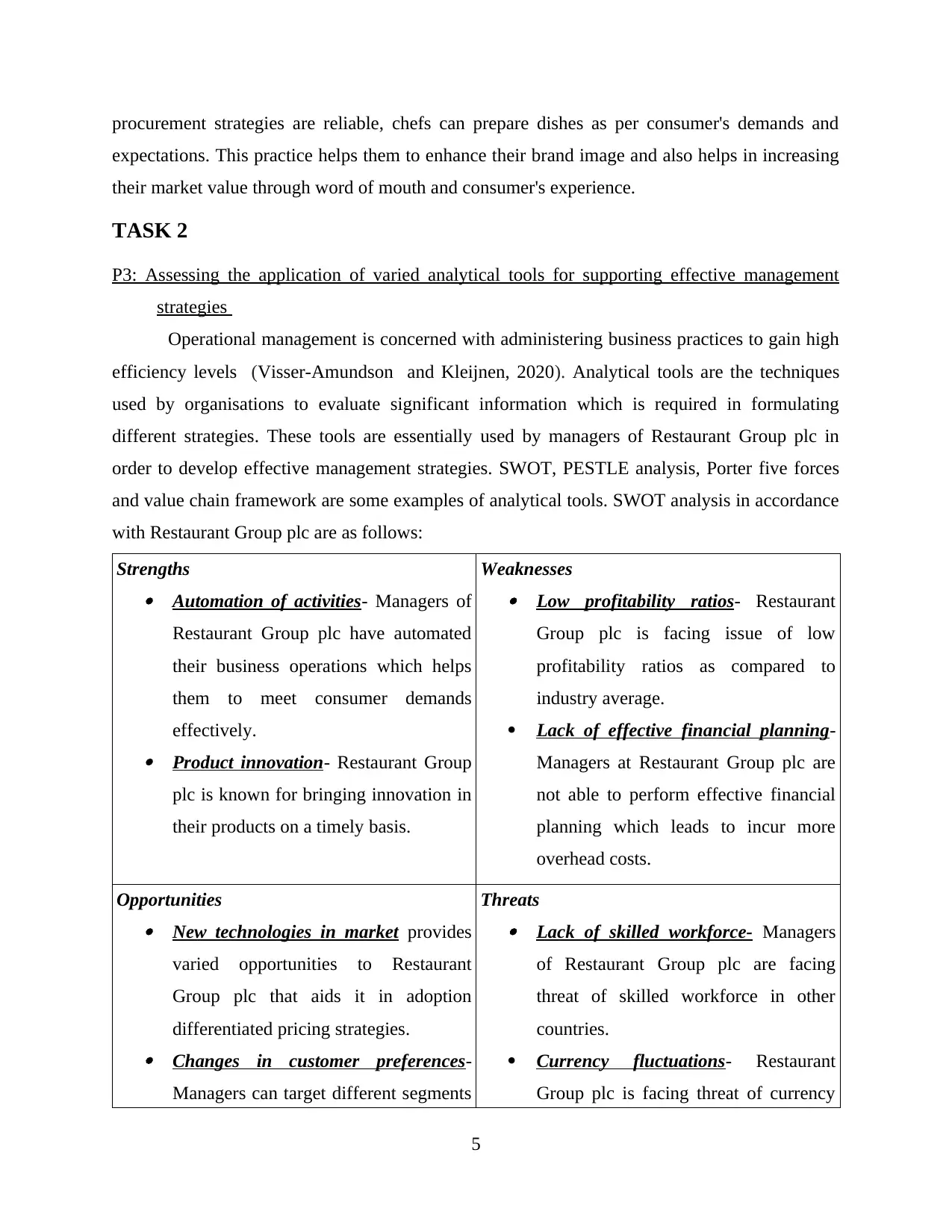
procurement strategies are reliable, chefs can prepare dishes as per consumer's demands and
expectations. This practice helps them to enhance their brand image and also helps in increasing
their market value through word of mouth and consumer's experience.
TASK 2
P3: Assessing the application of varied analytical tools for supporting effective management
strategies
Operational management is concerned with administering business practices to gain high
efficiency levels (Visser-Amundson and Kleijnen, 2020). Analytical tools are the techniques
used by organisations to evaluate significant information which is required in formulating
different strategies. These tools are essentially used by managers of Restaurant Group plc in
order to develop effective management strategies. SWOT, PESTLE analysis, Porter five forces
and value chain framework are some examples of analytical tools. SWOT analysis in accordance
with Restaurant Group plc are as follows:
Strengths Automation of activities- Managers of
Restaurant Group plc have automated
their business operations which helps
them to meet consumer demands
effectively. Product innovation- Restaurant Group
plc is known for bringing innovation in
their products on a timely basis.
Weaknesses
Low profitability ratios- Restaurant
Group plc is facing issue of low
profitability ratios as compared to
industry average.
Lack of effective financial planning-
Managers at Restaurant Group plc are
not able to perform effective financial
planning which leads to incur more
overhead costs.
Opportunities New technologies in market provides
varied opportunities to Restaurant
Group plc that aids it in adoption
differentiated pricing strategies. Changes in customer preferences-
Managers can target different segments
Threats
Lack of skilled workforce- Managers
of Restaurant Group plc are facing
threat of skilled workforce in other
countries.
Currency fluctuations- Restaurant
Group plc is facing threat of currency
5
expectations. This practice helps them to enhance their brand image and also helps in increasing
their market value through word of mouth and consumer's experience.
TASK 2
P3: Assessing the application of varied analytical tools for supporting effective management
strategies
Operational management is concerned with administering business practices to gain high
efficiency levels (Visser-Amundson and Kleijnen, 2020). Analytical tools are the techniques
used by organisations to evaluate significant information which is required in formulating
different strategies. These tools are essentially used by managers of Restaurant Group plc in
order to develop effective management strategies. SWOT, PESTLE analysis, Porter five forces
and value chain framework are some examples of analytical tools. SWOT analysis in accordance
with Restaurant Group plc are as follows:
Strengths Automation of activities- Managers of
Restaurant Group plc have automated
their business operations which helps
them to meet consumer demands
effectively. Product innovation- Restaurant Group
plc is known for bringing innovation in
their products on a timely basis.
Weaknesses
Low profitability ratios- Restaurant
Group plc is facing issue of low
profitability ratios as compared to
industry average.
Lack of effective financial planning-
Managers at Restaurant Group plc are
not able to perform effective financial
planning which leads to incur more
overhead costs.
Opportunities New technologies in market provides
varied opportunities to Restaurant
Group plc that aids it in adoption
differentiated pricing strategies. Changes in customer preferences-
Managers can target different segments
Threats
Lack of skilled workforce- Managers
of Restaurant Group plc are facing
threat of skilled workforce in other
countries.
Currency fluctuations- Restaurant
Group plc is facing threat of currency
5
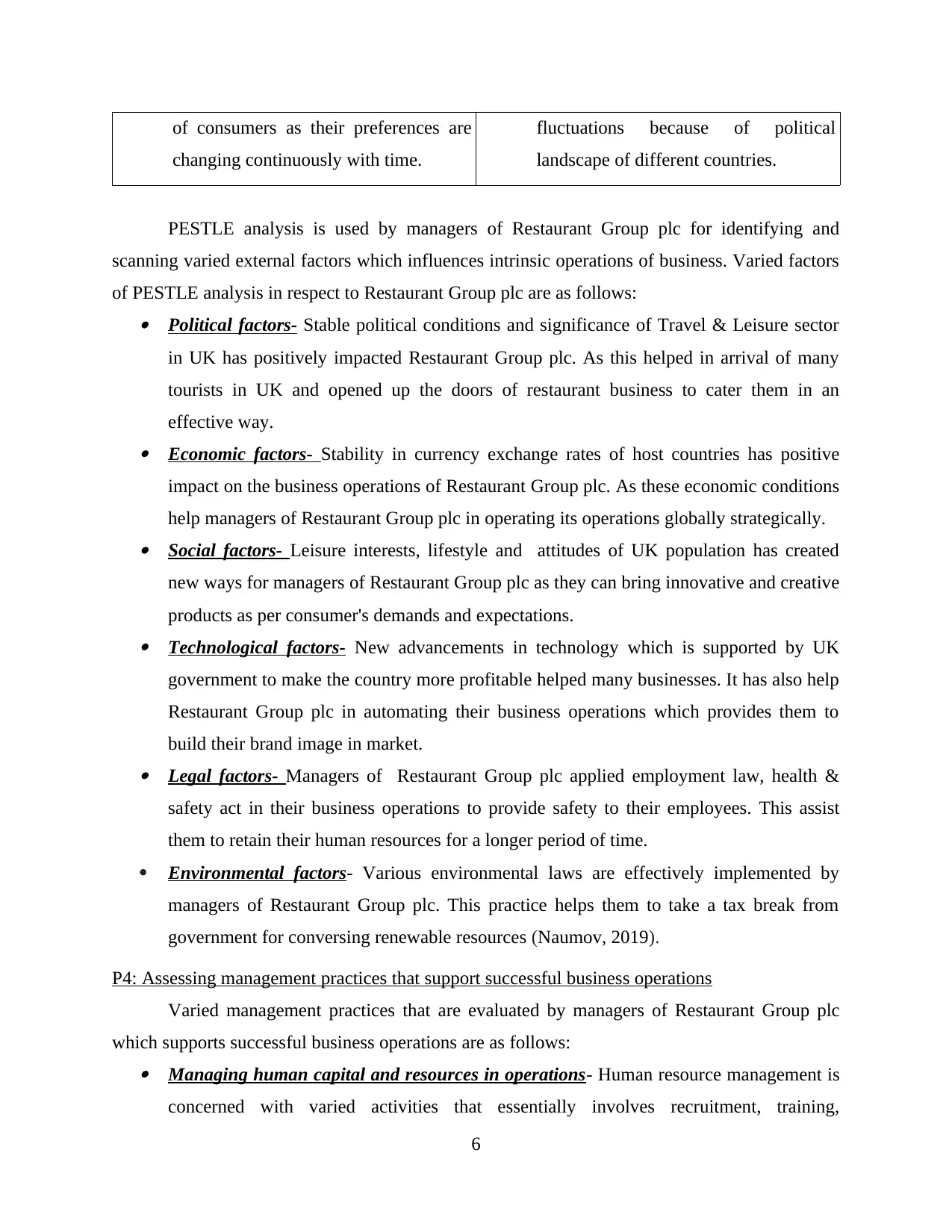
of consumers as their preferences are
changing continuously with time.
fluctuations because of political
landscape of different countries.
PESTLE analysis is used by managers of Restaurant Group plc for identifying and
scanning varied external factors which influences intrinsic operations of business. Varied factors
of PESTLE analysis in respect to Restaurant Group plc are as follows: Political factors- Stable political conditions and significance of Travel & Leisure sector
in UK has positively impacted Restaurant Group plc. As this helped in arrival of many
tourists in UK and opened up the doors of restaurant business to cater them in an
effective way. Economic factors- Stability in currency exchange rates of host countries has positive
impact on the business operations of Restaurant Group plc. As these economic conditions
help managers of Restaurant Group plc in operating its operations globally strategically. Social factors- Leisure interests, lifestyle and attitudes of UK population has created
new ways for managers of Restaurant Group plc as they can bring innovative and creative
products as per consumer's demands and expectations. Technological factors- New advancements in technology which is supported by UK
government to make the country more profitable helped many businesses. It has also help
Restaurant Group plc in automating their business operations which provides them to
build their brand image in market. Legal factors- Managers of Restaurant Group plc applied employment law, health &
safety act in their business operations to provide safety to their employees. This assist
them to retain their human resources for a longer period of time.
Environmental factors- Various environmental laws are effectively implemented by
managers of Restaurant Group plc. This practice helps them to take a tax break from
government for conversing renewable resources (Naumov, 2019).
P4: Assessing management practices that support successful business operations
Varied management practices that are evaluated by managers of Restaurant Group plc
which supports successful business operations are as follows: Managing human capital and resources in operations- Human resource management is
concerned with varied activities that essentially involves recruitment, training,
6
changing continuously with time.
fluctuations because of political
landscape of different countries.
PESTLE analysis is used by managers of Restaurant Group plc for identifying and
scanning varied external factors which influences intrinsic operations of business. Varied factors
of PESTLE analysis in respect to Restaurant Group plc are as follows: Political factors- Stable political conditions and significance of Travel & Leisure sector
in UK has positively impacted Restaurant Group plc. As this helped in arrival of many
tourists in UK and opened up the doors of restaurant business to cater them in an
effective way. Economic factors- Stability in currency exchange rates of host countries has positive
impact on the business operations of Restaurant Group plc. As these economic conditions
help managers of Restaurant Group plc in operating its operations globally strategically. Social factors- Leisure interests, lifestyle and attitudes of UK population has created
new ways for managers of Restaurant Group plc as they can bring innovative and creative
products as per consumer's demands and expectations. Technological factors- New advancements in technology which is supported by UK
government to make the country more profitable helped many businesses. It has also help
Restaurant Group plc in automating their business operations which provides them to
build their brand image in market. Legal factors- Managers of Restaurant Group plc applied employment law, health &
safety act in their business operations to provide safety to their employees. This assist
them to retain their human resources for a longer period of time.
Environmental factors- Various environmental laws are effectively implemented by
managers of Restaurant Group plc. This practice helps them to take a tax break from
government for conversing renewable resources (Naumov, 2019).
P4: Assessing management practices that support successful business operations
Varied management practices that are evaluated by managers of Restaurant Group plc
which supports successful business operations are as follows: Managing human capital and resources in operations- Human resource management is
concerned with varied activities that essentially involves recruitment, training,
6
⊘ This is a preview!⊘
Do you want full access?
Subscribe today to unlock all pages.

Trusted by 1+ million students worldwide
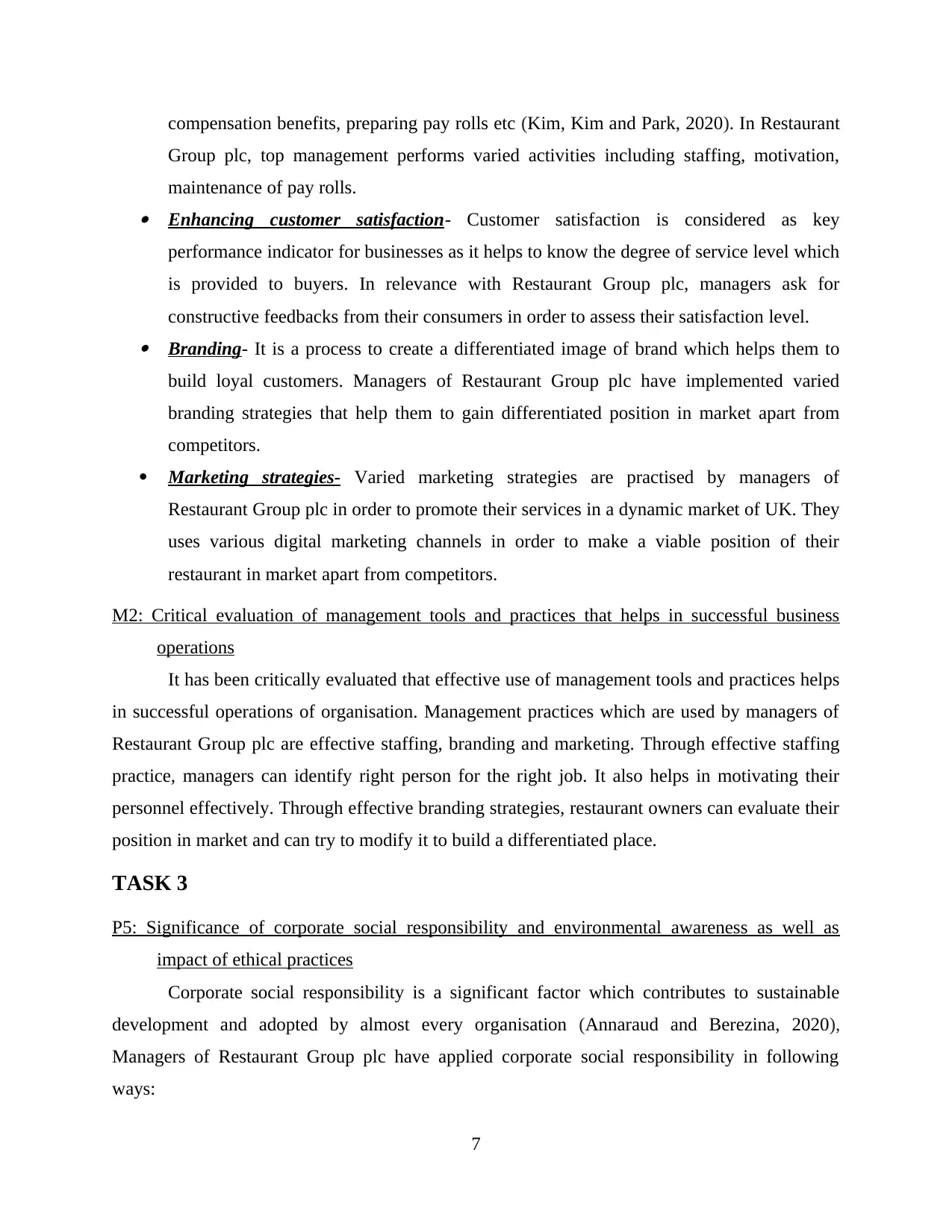
compensation benefits, preparing pay rolls etc (Kim, Kim and Park, 2020). In Restaurant
Group plc, top management performs varied activities including staffing, motivation,
maintenance of pay rolls. Enhancing customer satisfaction- Customer satisfaction is considered as key
performance indicator for businesses as it helps to know the degree of service level which
is provided to buyers. In relevance with Restaurant Group plc, managers ask for
constructive feedbacks from their consumers in order to assess their satisfaction level. Branding- It is a process to create a differentiated image of brand which helps them to
build loyal customers. Managers of Restaurant Group plc have implemented varied
branding strategies that help them to gain differentiated position in market apart from
competitors.
Marketing strategies- Varied marketing strategies are practised by managers of
Restaurant Group plc in order to promote their services in a dynamic market of UK. They
uses various digital marketing channels in order to make a viable position of their
restaurant in market apart from competitors.
M2: Critical evaluation of management tools and practices that helps in successful business
operations
It has been critically evaluated that effective use of management tools and practices helps
in successful operations of organisation. Management practices which are used by managers of
Restaurant Group plc are effective staffing, branding and marketing. Through effective staffing
practice, managers can identify right person for the right job. It also helps in motivating their
personnel effectively. Through effective branding strategies, restaurant owners can evaluate their
position in market and can try to modify it to build a differentiated place.
TASK 3
P5: Significance of corporate social responsibility and environmental awareness as well as
impact of ethical practices
Corporate social responsibility is a significant factor which contributes to sustainable
development and adopted by almost every organisation (Annaraud and Berezina, 2020),
Managers of Restaurant Group plc have applied corporate social responsibility in following
ways:
7
Group plc, top management performs varied activities including staffing, motivation,
maintenance of pay rolls. Enhancing customer satisfaction- Customer satisfaction is considered as key
performance indicator for businesses as it helps to know the degree of service level which
is provided to buyers. In relevance with Restaurant Group plc, managers ask for
constructive feedbacks from their consumers in order to assess their satisfaction level. Branding- It is a process to create a differentiated image of brand which helps them to
build loyal customers. Managers of Restaurant Group plc have implemented varied
branding strategies that help them to gain differentiated position in market apart from
competitors.
Marketing strategies- Varied marketing strategies are practised by managers of
Restaurant Group plc in order to promote their services in a dynamic market of UK. They
uses various digital marketing channels in order to make a viable position of their
restaurant in market apart from competitors.
M2: Critical evaluation of management tools and practices that helps in successful business
operations
It has been critically evaluated that effective use of management tools and practices helps
in successful operations of organisation. Management practices which are used by managers of
Restaurant Group plc are effective staffing, branding and marketing. Through effective staffing
practice, managers can identify right person for the right job. It also helps in motivating their
personnel effectively. Through effective branding strategies, restaurant owners can evaluate their
position in market and can try to modify it to build a differentiated place.
TASK 3
P5: Significance of corporate social responsibility and environmental awareness as well as
impact of ethical practices
Corporate social responsibility is a significant factor which contributes to sustainable
development and adopted by almost every organisation (Annaraud and Berezina, 2020),
Managers of Restaurant Group plc have applied corporate social responsibility in following
ways:
7
Paraphrase This Document
Need a fresh take? Get an instant paraphrase of this document with our AI Paraphraser
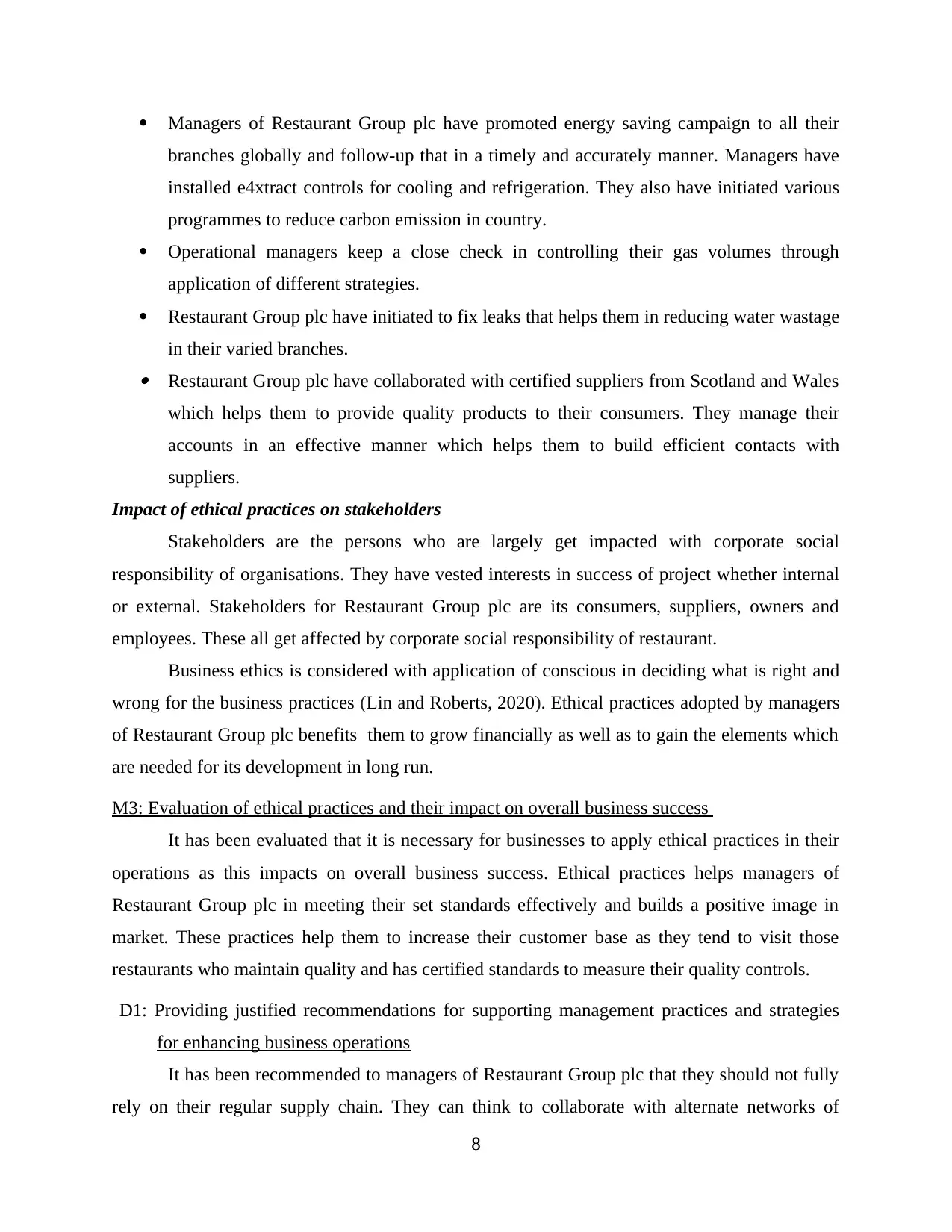
Managers of Restaurant Group plc have promoted energy saving campaign to all their
branches globally and follow-up that in a timely and accurately manner. Managers have
installed e4xtract controls for cooling and refrigeration. They also have initiated various
programmes to reduce carbon emission in country.
Operational managers keep a close check in controlling their gas volumes through
application of different strategies.
Restaurant Group plc have initiated to fix leaks that helps them in reducing water wastage
in their varied branches. Restaurant Group plc have collaborated with certified suppliers from Scotland and Wales
which helps them to provide quality products to their consumers. They manage their
accounts in an effective manner which helps them to build efficient contacts with
suppliers.
Impact of ethical practices on stakeholders
Stakeholders are the persons who are largely get impacted with corporate social
responsibility of organisations. They have vested interests in success of project whether internal
or external. Stakeholders for Restaurant Group plc are its consumers, suppliers, owners and
employees. These all get affected by corporate social responsibility of restaurant.
Business ethics is considered with application of conscious in deciding what is right and
wrong for the business practices (Lin and Roberts, 2020). Ethical practices adopted by managers
of Restaurant Group plc benefits them to grow financially as well as to gain the elements which
are needed for its development in long run.
M3: Evaluation of ethical practices and their impact on overall business success
It has been evaluated that it is necessary for businesses to apply ethical practices in their
operations as this impacts on overall business success. Ethical practices helps managers of
Restaurant Group plc in meeting their set standards effectively and builds a positive image in
market. These practices help them to increase their customer base as they tend to visit those
restaurants who maintain quality and has certified standards to measure their quality controls.
D1: Providing justified recommendations for supporting management practices and strategies
for enhancing business operations
It has been recommended to managers of Restaurant Group plc that they should not fully
rely on their regular supply chain. They can think to collaborate with alternate networks of
8
branches globally and follow-up that in a timely and accurately manner. Managers have
installed e4xtract controls for cooling and refrigeration. They also have initiated various
programmes to reduce carbon emission in country.
Operational managers keep a close check in controlling their gas volumes through
application of different strategies.
Restaurant Group plc have initiated to fix leaks that helps them in reducing water wastage
in their varied branches. Restaurant Group plc have collaborated with certified suppliers from Scotland and Wales
which helps them to provide quality products to their consumers. They manage their
accounts in an effective manner which helps them to build efficient contacts with
suppliers.
Impact of ethical practices on stakeholders
Stakeholders are the persons who are largely get impacted with corporate social
responsibility of organisations. They have vested interests in success of project whether internal
or external. Stakeholders for Restaurant Group plc are its consumers, suppliers, owners and
employees. These all get affected by corporate social responsibility of restaurant.
Business ethics is considered with application of conscious in deciding what is right and
wrong for the business practices (Lin and Roberts, 2020). Ethical practices adopted by managers
of Restaurant Group plc benefits them to grow financially as well as to gain the elements which
are needed for its development in long run.
M3: Evaluation of ethical practices and their impact on overall business success
It has been evaluated that it is necessary for businesses to apply ethical practices in their
operations as this impacts on overall business success. Ethical practices helps managers of
Restaurant Group plc in meeting their set standards effectively and builds a positive image in
market. These practices help them to increase their customer base as they tend to visit those
restaurants who maintain quality and has certified standards to measure their quality controls.
D1: Providing justified recommendations for supporting management practices and strategies
for enhancing business operations
It has been recommended to managers of Restaurant Group plc that they should not fully
rely on their regular supply chain. They can think to collaborate with alternate networks of
8
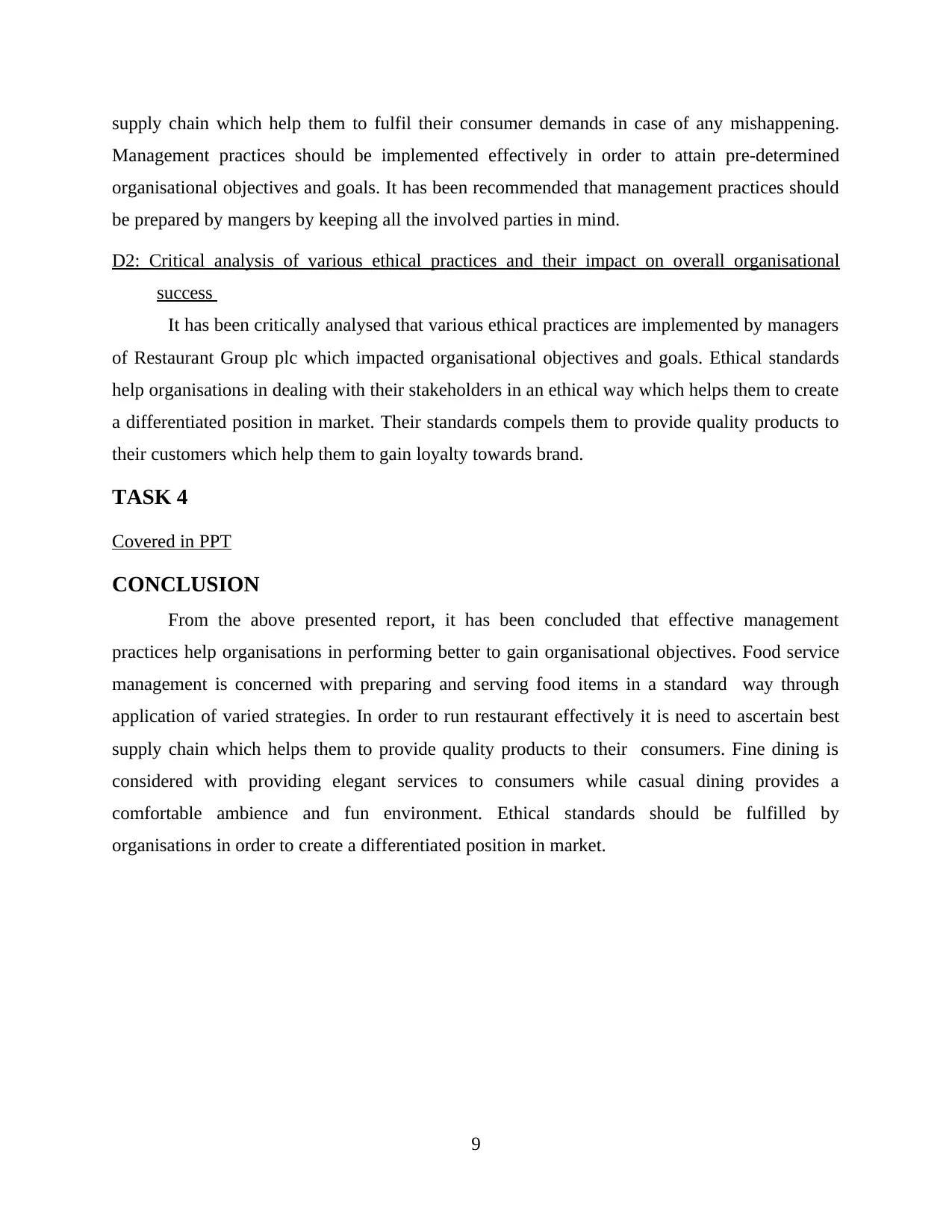
supply chain which help them to fulfil their consumer demands in case of any mishappening.
Management practices should be implemented effectively in order to attain pre-determined
organisational objectives and goals. It has been recommended that management practices should
be prepared by mangers by keeping all the involved parties in mind.
D2: Critical analysis of various ethical practices and their impact on overall organisational
success
It has been critically analysed that various ethical practices are implemented by managers
of Restaurant Group plc which impacted organisational objectives and goals. Ethical standards
help organisations in dealing with their stakeholders in an ethical way which helps them to create
a differentiated position in market. Their standards compels them to provide quality products to
their customers which help them to gain loyalty towards brand.
TASK 4
Covered in PPT
CONCLUSION
From the above presented report, it has been concluded that effective management
practices help organisations in performing better to gain organisational objectives. Food service
management is concerned with preparing and serving food items in a standard way through
application of varied strategies. In order to run restaurant effectively it is need to ascertain best
supply chain which helps them to provide quality products to their consumers. Fine dining is
considered with providing elegant services to consumers while casual dining provides a
comfortable ambience and fun environment. Ethical standards should be fulfilled by
organisations in order to create a differentiated position in market.
9
Management practices should be implemented effectively in order to attain pre-determined
organisational objectives and goals. It has been recommended that management practices should
be prepared by mangers by keeping all the involved parties in mind.
D2: Critical analysis of various ethical practices and their impact on overall organisational
success
It has been critically analysed that various ethical practices are implemented by managers
of Restaurant Group plc which impacted organisational objectives and goals. Ethical standards
help organisations in dealing with their stakeholders in an ethical way which helps them to create
a differentiated position in market. Their standards compels them to provide quality products to
their customers which help them to gain loyalty towards brand.
TASK 4
Covered in PPT
CONCLUSION
From the above presented report, it has been concluded that effective management
practices help organisations in performing better to gain organisational objectives. Food service
management is concerned with preparing and serving food items in a standard way through
application of varied strategies. In order to run restaurant effectively it is need to ascertain best
supply chain which helps them to provide quality products to their consumers. Fine dining is
considered with providing elegant services to consumers while casual dining provides a
comfortable ambience and fun environment. Ethical standards should be fulfilled by
organisations in order to create a differentiated position in market.
9
⊘ This is a preview!⊘
Do you want full access?
Subscribe today to unlock all pages.

Trusted by 1+ million students worldwide
1 out of 14
Related Documents
Your All-in-One AI-Powered Toolkit for Academic Success.
+13062052269
info@desklib.com
Available 24*7 on WhatsApp / Email
![[object Object]](/_next/static/media/star-bottom.7253800d.svg)
Unlock your academic potential
Copyright © 2020–2026 A2Z Services. All Rights Reserved. Developed and managed by ZUCOL.





